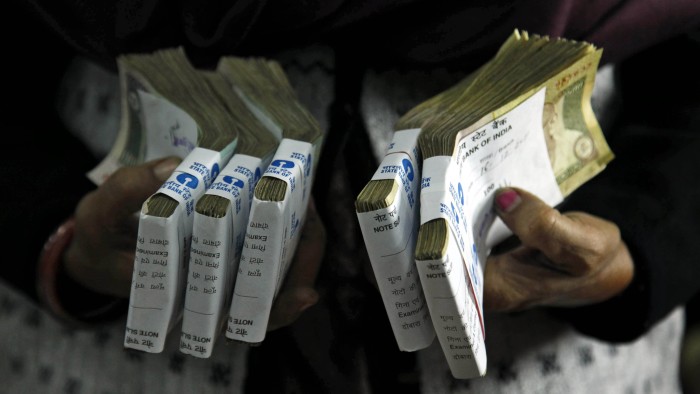India scraps high-value banknotes in black economy clampdown

Roula Khalaf, Editor of the FT, selects her favourite stories in this weekly newsletter.
India unexpectedly scrapped all larger-denomination banknotes overnight in what New Delhi said was a move to stop counterfeiting and clamp down on the black economy.
Prime Minister Narendra Modi said 500 and 1,000 rupee notes — worth around $7.50 and $15, respectively — would cease to be legal tender from midnight on Tuesday. The announcement stunned Indians, who were given four hours’ notice that much of their cash would be “mere paper”.
RBI data suggests that the Rs500 and Rs1,000 notes account for 86 per cent of the value of all cash in circulation in India at present. Shortly after the news, Indian television showed queues building outside petrol stations and cash dispensers.
The shock move is the latest step by Mr Modi’s administration to crack down on the vast shadow economy, which remains beyond the reach of India’s tax authorities.
Indians will be allowed to deposit or exchange their old currency notes at banks and post offices until the end of the year but they will not be usable anywhere else, except in hospitals and pharmacies for another few weeks.
New Delhi promised to introduce a series of higher value banknotes with additional security features in the denominations of Rs500 and Rs2,000 on Thursday, after a surprise bank holiday on Wednesday. In the interim, the Rs100 note, worth around $1.50, will be the highest legal tender note.
The government also said that Indians would initially be restricted to withdrawing Rs2,000 per day from cash machines or banks, increasing to Rs4,000 from November 19, a restriction that some economists said might damp business for some time.
“For a brief period of time, it could well be a shock to smaller businesses,” said Jahangir Aziz, head of emerging market economics for JPMorgan. “People are going to become very anxious.”
Urjit Patel, the recently appointed governor of the Reserve Bank of India, said the decision had been taken jointly by the government and the central bank and was “a powerful step to fight the use of black money and . . . counterfeit notes”. Some 16.5bn notes of the Rs500 denomination and 6.7bn Rs1,000 rupee notes will need to be exchanged.
Analysts said that Indians holding currency derived from legitimate sources — and on which they had paid income taxes — would have no difficulties but Indians who were sitting on piles of cash from illegitimate activities, including as the result of corruption, would be caught out.
“Wiping out the existing high-denomination notes will put a scare in those holding them for illicit purposes and spur a move towards more efficient electronic payment systems,” said Eswar Prasad, an economics professor at Cornell University.
But he also cautioned: “This move will at best put a modest and temporary crimp on illicit activities in the absence of other reforms.”
The move follows the end of a four-month amnesty for tax evaders, who declared $9.8bn of previously undisclosed assets, paying a penalty of 45 per cent. New Delhi had promised to take stern measures against those who failed take up the opportunity to declare their black money and bring it into the formal financial system.
“Given the extent of black money we have in this country, a stringent measure was needed,” said Tushar Arora, an economist at HDFC Bank, adding that the measure would help the drive to formalise India’s economy and boost tax revenues.
“It’s good that the government has taken people by surprise,” Mr Arora added. “If they’d given warning, people would have found loopholes.”
But he admitted the sudden step “might lead to some confusion in the near term” and there was the possibility of short-term cash shortages if the transition were not handled smoothly.
Shaktikanta Das, the finance secretary, said banks would keep records of those who came to deposit or exchange the old high-value currency notes and urged Indians not to assist friends or family in depositing unaccounted cash or funds from illegitimate sources.
JPMorgan’s Mr Aziz warned that the move could inadvertently hurt poor Indians in remote, rural locations, who may hold higher denomination notes as savings and who may not get the news in time to deposit or exchange notes by the end of the year.
“The poor are usually less informed than the urban middle class and they will lose the most if they don’t transfer into the notes at the right time,” he said.
Comments